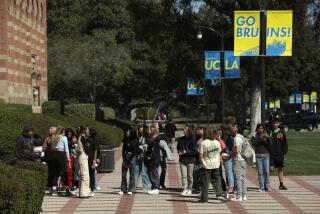State’s Campuses Will Admit Illegal Aliens as Residents
- Share via
California’s public universities have decided to admit illegal aliens as state residents, opening their doors to the thousands of foreign-born students who have grown up here but are not legal citizens.
In the past two weeks, lawyers for both the University of California and the California State University systems have sent memoranda to campus registrars saying that children of illegal aliens should be treated the same as American citizens.
“The fact that they are undocumented aliens is not a disqualifying circumstance,” said Donald Reidhaar, general counsel for the University of California.
The action may finally put an end to a dispute that has bounced around for two years among the Legislature, the attorney general, the courts and the universities. In April, an Alameda County Superior Court said that under current state law, illegal alien children should be considered state residents if they had lived here more than one year and intended to stay.
Both UC and CSU lawyers say they recently decided against an appeal of the ruling.
University officials said they have no idea how many students the policy--which takes effect in September--will affect.
“We don’t expect a real influx of these students,” UCLA Registrar William Locklear said. He and Reidhaar noted that UC has “very stringent admissions standards” that bar all but the best students.
However, under the new policy, illegal alien students can apply for admission as California residents if they can show they have lived in the state for more than one year and plan to establish permanent residency, Reidhaar said.
Foreign students who are here on student visas will not be able to seek state residency, he noted.
At UCLA, a California resident pays fees of $1,296 for a regular school year. Under the previous policy, a student who declared himself an illegal alien was charged the non-resident tuition of $5,112 a year. The CSU campuses charge $633 a year to resident students and about $3,200 a year to non-residents.
In the past, some illegal aliens may have enrolled at UCLA and declared themselves as U.S. citizens, UCLA’s Locklear said, and others have agreed to pay tuition as out-of-state students.
“Those students will be able to refile as residents now,” Locklear said. “I disagree with this court ruling, but we will have to implement it.”
Cal State attorneys also disagreed initially with the ruling but decided that an appeal “would send the wrong signal to the Hispanic community,” said Mayer Chapman, vice chancellor and general counsel. “We have been trying very hard to get more Hispanic students. The court was worried that a whole segment of our population could lose out on a higher education, and we agreed with that.”
But the Cal State counsel said this dispute should not have been decided in a California courtroom. “What we need is an overall immigration policy from the federal government,” Chapman said.
Unlike the universities, the public schools in California have for years enrolled children without asking questions about their citizenship status. Los Angeles high school counselors have said that many of their top students are barred from going to college because they are not legal citizens. Most cannot afford the high tuition cost for non-residents. They also are reluctant to admit that they are not U.S. citizens, counselors said.
“In all respects, these people are bona fide residents of the state,” said Susan Brown, attorney for the Mexican-American Legal Defense and Education Fund in San Francisco, which brought the suit in Alameda County on behalf of five illegal aliens.
“They had been brought here as young children, went to school here; their parents paid taxes here, and they intended to stay here,” she said. “The question is, ‘Do we want to preclude them from the university system?’ ”
The California community colleges were not included in the court ruling, but most have been admitting students without regard to their citizenship.
More to Read
Sign up for Essential California
The most important California stories and recommendations in your inbox every morning.
You may occasionally receive promotional content from the Los Angeles Times.














